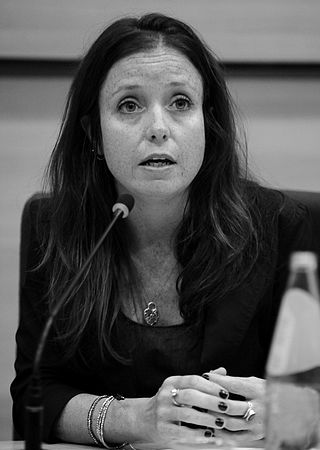Related Research Articles

Food security is the state of having reliable access to a sufficient quantity of affordable, nutritious food. The availability of food for people of any class, gender or religion is another element of food security. Similarly, household food security is considered to exist when all the members of a family, at all times, have access to enough food for an active, healthy life. Individuals who are food-secure do not live in hunger or fear of starvation. Food security includes resilience to future disruptions of food supply. Such a disruption could occur due to various risk factors such as droughts and floods, shipping disruptions, fuel shortages, economic instability, and wars. Food insecurity is the opposite of food security: a state where there is only limited or uncertain availability of suitable food.

Food sovereignty is a food system in which the people who produce, distribute, and consume food also control the mechanisms and policies of food production and distribution. This stands in contrast to the present corporate food regime, in which corporations and market institutions control the global food system. Food sovereignty emphasizes local food economies, sustainable food availability, and centers culturally appropriate foods and practices. Changing climates and disrupted foodways disproportionately impact indigenous populations and their access to traditional food sources while contributing to higher rates of certain diseases; for this reason, food sovereignty centers indigenous peoples. These needs have been addressed in recent years by several international organizations, including the United Nations, with several countries adopting food sovereignty policies into law. Critics of food sovereignty activism believe that the system is founded on inaccurate baseline assumptions; disregards the origins of the targeted problems; and is plagued by a lack of consensus for proposed solutions.

Urban agriculture refers to various practices of cultivating, processing, and distributing food in urban areas. The term also applies to the area activities of animal husbandry, aquaculture, beekeeping, and horticulture in an urban context. Urban agriculture is distinguished from peri-urban agriculture, which takes place in rural areas at the edge of suburbs.
Wayne Roberts was a Canadian food policy analyst and writer. He was known for his role as the manager of the Toronto Food Policy Council (TFPC) from 2000-2010. The TFPC, a citizen body of thirty food activists, is responsible for generating food policy for the City of Toronto government.

Food policy is the area of public policy concerning how food is produced, processed, distributed, purchased, or provided. Food policies are designed to influence the operation of the food and agriculture system balanced with ensuring human health needs. This often includes decision-making around production and processing techniques, marketing, availability, utilization, and consumption of food, in the interest of meeting or furthering social objectives. Food policy can be promulgated on any level, from local to global, and by a government agency, business, or organization. Food policymakers engage in activities such as regulation of food-related industries, establishing eligibility standards for food assistance programs for the poor, ensuring safety of the food supply, food labeling, and even the qualifications of a product to be considered organic.
Food politics is a term which encompasses not only food policy and legislation, but all aspects of the production, control, regulation, inspection, distribution and consumption of commercially grown, and even sometimes home grown, food. The commercial aspects of food production are affected by ethical, cultural, and health concerns, as well as environmental concerns about farming and agricultural practices and retailing methods. The term also encompasses biofuels, GMO crops and pesticide use, the international food market, food aid, food security and food sovereignty, obesity, labor practices and immigrant workers, issues of water usage, animal cruelty, and climate change.

A sustainable food system is a type of food system that provides healthy food to people and creates sustainable environmental, economic, and social systems that surround food. Sustainable food systems start with the development of sustainable agricultural practices, development of more sustainable food distribution systems, creation of sustainable diets, and reduction of food waste throughout the system. Sustainable food systems have been argued to be central to many or all 17 Sustainable Development Goals.
The term food system describes the interconnected systems and processes that influence nutrition, food, health, community development, and agriculture. A food system includes all processes and infrastructure involved in feeding a population: growing, harvesting, processing, packaging, transporting, marketing, consumption, distribution, and disposal of food and food-related items. It also includes the inputs needed and outputs generated at each of these steps.
The IATP Food and Society Fellows Program provides two-year, part-time fellowships to professionals working to address health, social justice, economic viability, environmental, and other issues in food and farming systems.
The University of Maryland College of Agriculture and Natural Resources is the agricultural and environmental sciences college of the University of Maryland and operates the Maryland Sea Grant College in cooperation with the University of Maryland Center for Environmental Science and the National Oceanic and Atmospheric Administration.
A sustainability organization is (1) an organized group of people that aims to advance sustainability and/or (2) those actions of organizing something sustainably. Unlike many business organizations, sustainability organizations are not limited to implementing sustainability strategies which provide them with economic and cultural benefits attained through environmental responsibility. For sustainability organizations, sustainability can also be an end in itself without further justifications.

Danielle J. Nierenberg is an American activist, author and journalist.
Community food security (CFS) is a relatively new concept that captures emerging ideas about the central place of food in communities. At times it refers to the measure of food access and availability at the community level, and at other times to a goal or framework for place-based food systems. It builds upon the more commonly understood concept of food security, which refers to food access and availability at an individual or household level (in health and social policy, for instance) and at a national or global level (e.g., in international development and aid work). Hamm and Bellows (2003) define CFS as “a situation in which all community residents obtain a safe, culturally acceptable, nutritionally adequate diet through a sustainable food system that maximizes community self-reliance and social justice” (p. 37). CFS involves social, economic, and institutional factors, and their interrelationships within a community that impact availability and access to resources to produce food locally. It takes into account environmental sustainability and social fairness through measures of the availability and affordability of food in that community relative to the financial resources available to purchase or produce it.

Urban agriculture in West Oakland involves the implementation of Urban agriculture in West Oakland, California.
Lindiwe Sibanda Majele (born 1963) is a Zimbabwean professor, scientist, policy advocate and influencer on food systems. She currently serves as director and chair of the ARUA Centre of Excellence in Sustainable Food Systems (ARUA-SFS) at the University of Pretoria in Pretoria, South Africa as well as founder and managing director of Linds Agricultural Services Pvt Ltd. in Harare, Zimbabwe. She is currently a board member of Nestlé where she is also a member of the Sustainability Committee.
The Food Justice Movement is a grassroots initiative which emerged in response to food insecurity and economic pressures that prevent access to healthy, nutritious, and culturally appropriate foods. The food justice movement moves beyond increasing food availability and works to address the root cause of unequal access to adequate nutrition. Like other Environmental Justice initiatives, the Food Justice Movement advocates for rights-based solutions that identify the underlying human rights that allow individuals to achieve adequate food security and nutrition. This differs from policy-based solutions that focus on food availability and affordability by increasing food production or lowering the cost of food.
Barbara A. Burlingame is a nutrition scientist specializing in food composition, biodiversity for food and nutrition, sustainable diets and sustainable food systems, and traditional food systems of indigenous peoples. She is involved in nutrition policy development at the global level, and is currently a professor at Massey University.
Rosamond (Roz) Lee Naylor is an American economist focused on global food security and sustainable agriculture. She is the William Wrigley Professor of the Stanford University School of Earth System Science, and the founding Director of the Center on Food Security and the Environment at Stanford University. Her academic career has centered on environmental science and policy related to global food systems and food security. She is the President of the Board of Directors of the Aspen Global Change Institute, a Fellow of the Ecological Society of America, and a member of the Forest Protection Advisory Panel for Cargill.
Keep Growing Detroit is an organization dedicated to food sovereignty and community engagement in the cities of Detroit, Hamtramck, and Highland Park. Founded in 2013, the program designs and implements initiatives that promote the practice of urban agriculture as a mode of food justice for underrepresented communities, particularly those who do not have access to healthy food options. The goals of Keep Growing Detroit are to educate and empower community members using urban agricultural practices. Programs such as the Garden Resource Program and Grown in Detroit served as catalysts, laying the foundation for Keep Growing Detroit.
The Indianapolis Community Food Access Coalition was recognized by the City-County Council of Indianapolis, Indiana, as part of the Division of Community Food Nutrition and Policy, which was established at the same time. The Division is intended to rectify "racial inequality in the food system" and decrease "food insecurity in Indianapolis" by funding local food growers. The Coalition was created through Indianapolis Ordinance 337, which was proposed in November 2020 and "recognized" in January 2021.
References
- ↑ See Harriet Friedmann,"Bringing public institutions and food service companies into the project for a local, sustainable food system in Ontario," Agriculture and Human Values, 24,3, March, 2007; Culture & Agriculture Winter 1994, Vol. -, No. 50, pp. 15-18 Posted online on December 10, 2004
- ↑ See, for example, Harriet Friedmann, "Bringing public institutions and food service companies into the project for a local, sustainable food system in Ontario," Agriculture and Human Values, 24,3, March, 2007
- ↑ "2009 Green Toronto Awards Winners | Green GTA". Greengta.ca. Archived from the original on 2012-02-23. Retrieved 2012-01-04.
- ↑ City of Toronto's Official plan [ dead link ]
- ↑ "Toronto Food Policy Council's website". Toronto.ca. 2000-03-06. Archived from the original on 2012-01-18. Retrieved 2012-01-04.
- ↑ "www.foodforethought.net". www.foodforethought.net. Retrieved 2012-01-04.